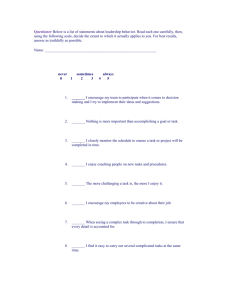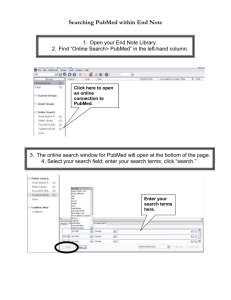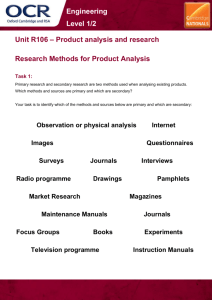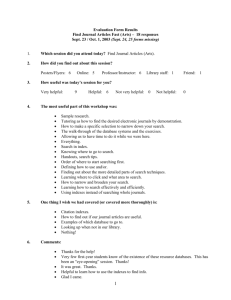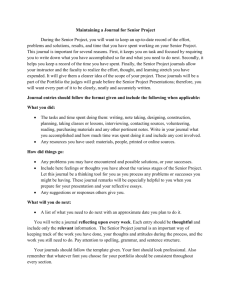Finding information in articles Katie Newman, Biotechnology Librarian &
advertisement
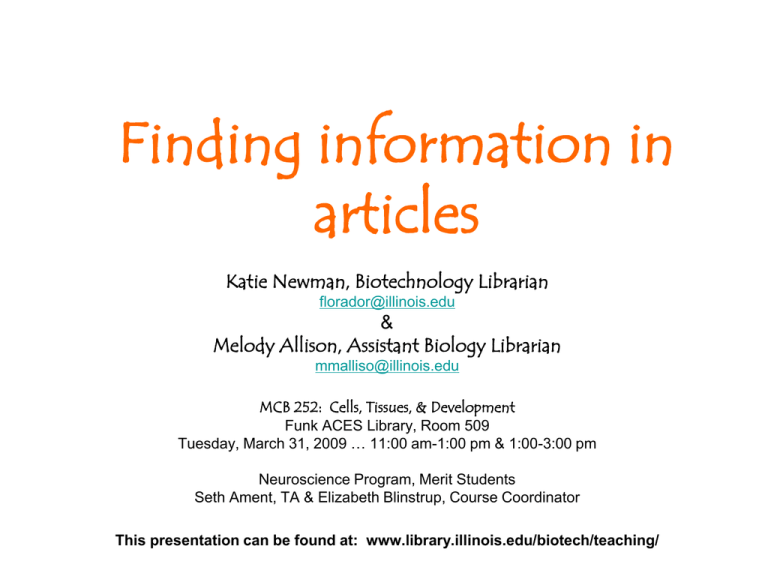
Finding information in articles Katie Newman, Biotechnology Librarian florador@illinois.edu & Melody Allison, Assistant Biology Librarian mmalliso@illinois.edu MCB 252: Cells, Tissues, & Development Funk ACES Library, Room 509 Tuesday, March 31, 2009 … 11:00 am-1:00 pm & 1:00-3:00 pm Neuroscience Program, Merit Students Seth Ament, TA & Elizabeth Blinstrup, Course Coordinator This presentation can be found at: www.library.illinois.edu/biotech/teaching/ Today we are going to …. • Get acquainted with Library resources and how to find them • From a biomedical research news article (secondary source) • Find the scholarly research publication article (primary source) upon which the news article was based Navigating Key Resources from the Library • Main Gateway: www.library.illinois.edu/ • Library Catalog: …to find books & journals (paper / electronic) • Online Research Resources (ORR): …to find e-journals and the tools (indexes) with which to locate the articles IN journals www.library.illinois.edu/orr/ See flyer for top bio-ag indexes! • Easy Search: …to find the tool that has the most information about a topic Let’s look at a science news article • Go to the ORR • Open the index, Academic Search Premier • Search for: – Science News …. In So Journal Name and – Nerve cells … – Published: 2007 – 2009 • Browse the results list and find the article “Mouse, Heal Thyself” • Read / browse the article, and see if you can figure out how to find the original (primary) article on which this news item (secondary article) is based. [5 minutes on your own] “Journals” vs “Magazines” • What is the difference between “Journals” (primary sources such as Nature Medicine) and “Magazines” (secondary sources such as Science News, Scientific American) See: http://tinyurl.com/dcn9jz, from the Biology Library website http://www.library.illinois.edu/bix/, for a comparison of the traits of journals & magazines Let’s Explore PubMed • Can you find the primary article in PubMed? [5 minutes] • Now you can utilize various PubMed features to identify other relevant articles – – – – Click on Related Articles for other articles on the topic Click on the author’s name for other articles by author View in Citation mode to view subject headings Search “Journals Database” to find out if PubMed indexes a journal – Find a review article on a topic • Locate full text copies of articles using ‘Discover,’ the ORR, or Interlibrary loan • Print or email PubMed search results • Login to set up Search Alerts and customize PubMed Tips and Tricks for Searching PubMed • Truncate (stem words) with an asterisk (*) neur* Note: this turns off automatic term mapping (ATM) to MeSH terms • Use Limits tab to restrict search to an author, journal, range of years, type of article (e.g., review articles) • Use Details tab to see the behind the scenes search (ATM) that was performed if search for nerve cells, PubMed searches for that, but also NEURONS • To search for a phrase, enclose words in quotation marks. However, this will turn off ATM “nerve cells” PubMed vs. Google Scholar • Indexed by human experts • Uses automated extraction of information from text and citations • Searches default fields (e.g., title, author, etc.) • Searches full text – may need subscription to read articles • Easily find what journals are indexed (affects ‘cited by’, what time frame covered • Don’t know what journals are being searched (affects ‘cited by’), what time frame covered. • Controlled vocabulary (subject headings) which can be utilized for searching • No controlled vocabulary (subject headings) • Can select and work with MANY citations at a time • Can work with 1 citation at a time • Know which journals it indexes • Don’t know which journals are being indexed Let’s Review … Finding tools Online Library Catalog Periodical Indexes (e.g., PubMed) • Free to use • Usually subscribed to by the University • Used to find books, journals, newspapers, DVDs, CDs, and other materials, print or electronic, owned by the library • Used to locate individual articles • Cannot search for individual articles. Rather, used to locate journal and magazine titles that contain individual articles. • Indexes articles within a certain set of journals. Databases may overlap in content • Provides information about resources owned by a particular • May or may not have links to full text to any given article. If not, you may have to use the ORR to find the journal that has the full text And remember if you need help …… ...ask a librarian!

